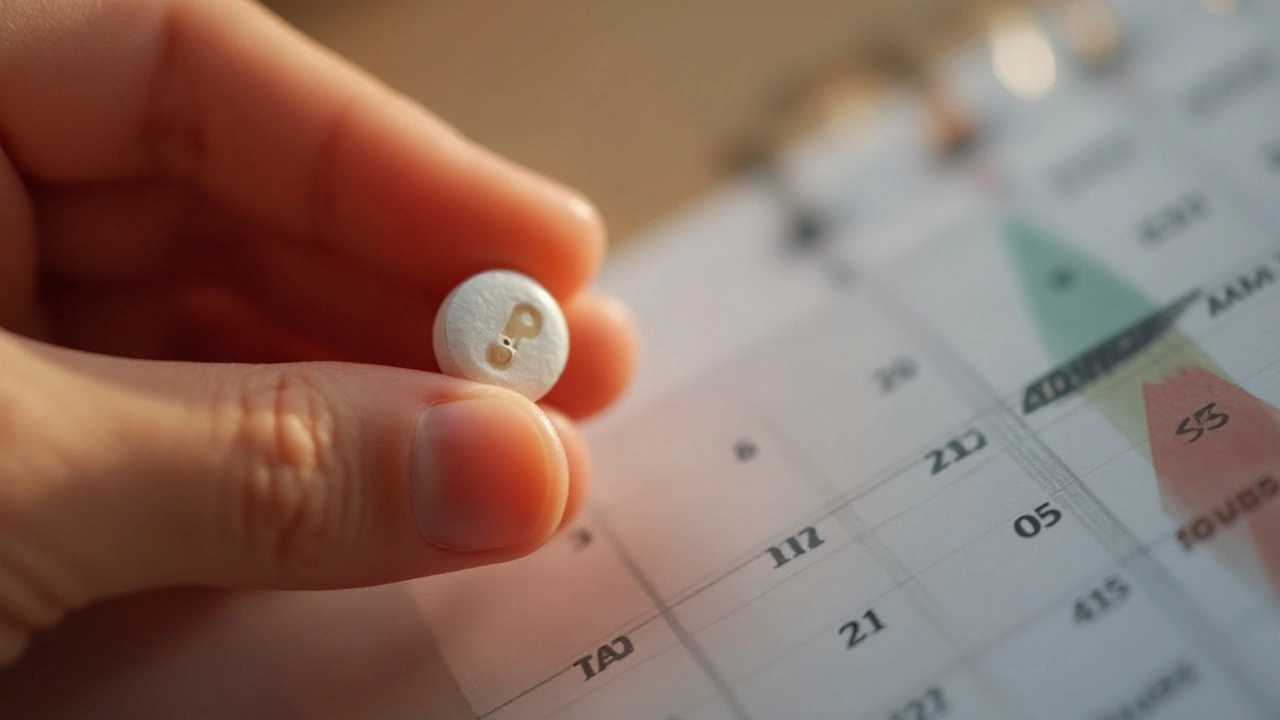I-Pill is a brand name for a levonorgestrel‑based emergency contraceptive pill that can prevent an unwanted pregnancy after unprotected sex. This guide breaks down everything you need to know - from timing and dosage to where you can get it in the UK, common side‑effects, and how it stacks up against other options.
TL;DR - Quick Takeaways
- Take the I‑Pill as soon as possible after unprotected sex - ideally within 12hours.
- One tablet works for up to 72hours; effectiveness drops from ~95% (within 12h) to ~58% (at 72h).
- Common side‑effects: nausea, tiredness, spotting; serious reactions are rare.
- Available without prescription at most pharmacies and online retailers in the UK; price ranges £20‑£35.
- Not a regular birth control method - use ongoing contraception for future protection.
How the I‑Pill Works and When It’s Effective
The I‑Pill contains 1.5mg of levonorgestrel, a synthetic progestogen. It mainly works by:
- Delaying ovulation so the egg isn’t released in time for fertilisation.
- Thickening cervical mucus to hinder sperm movement.
- Altering the uterine lining, making it less receptive to a fertilised egg.
If fertilisation has already occurred and the embryo has implanted, the I‑Pill will not terminate a pregnancy.
Timing is crucial. Studies from the UK’s NHS and the WHO show the following effectiveness rates:
| Time After Intercourse | Effectiveness |
|---|---|
| 0‑12hours | ~95% |
| 12‑24hours | ~85% |
| 24‑48hours | ~75% |
| 48‑72hours | ~58% |
Because effectiveness drops sharply after 72hours, treat the I‑Pill as an emergency, not a standby option.
Step‑by‑Step: How to Take the I‑Pill Correctly
- Buy the pill. You can purchase it in person at any pharmacy (Walk‑in or through a pharmacist) or order it online from a reputable UK retailer.
- Read the patient information leaflet (PIL) thoroughly. It outlines dosage, possible interactions, and what to do if you vomit within two hours of taking the pill.
- Take the tablet with a glass of water. It can be taken with or without food - food does not affect absorption.
- If you vomit within two hours, repeat the dose with a new tablet.
- Monitor for side‑effects over the next 24‑48hours. Most symptoms are mild and resolve without treatment.
- Schedule a routine contraception method (e.g., combined oral contraceptive, implant) if you need ongoing protection.
Do NOT take a second I‑Pill as a “double dose” hoping for extra protection. This won’t increase effectiveness and raises the risk of side‑effects.
Side‑Effects, Risks, and Who Should Avoid the I‑Pill
Most users experience only mild, short‑lived symptoms:
- Nausea (≈25% of users)
- Fatigue or dizziness
- Breast tenderness
- Spotting or light bleeding (particularly if taken close to your expected period)
Serious adverse events (allergic reaction, severe abdominal pain) are extremely rare - less than 1 in 10,000 users.
Contra‑indications (situations where the I‑Pill should be avoided or used with caution):
- Known sensitivity to levonorgestrel or any pill component.
- Current pregnancy - the pill offers no benefit and should not be taken.
- Severe liver disease - metabolism may be impaired.
If you have a history of blood clots, hormone‑sensitive cancers, or are on medications that interfere with hormonal contraception (e.g., some antiretrovirals, epilepsy drugs), discuss alternatives with a pharmacist or GP.

Where to Get the I‑Pill in the UK and What It Costs
In England, Wales, Scotland and Northern Ireland, the I‑Pill is classified as a pharmacy‑only medicine (POM). You do not need a prescription, but a pharmacist must see you to ensure safe use.
Typical price points (as of September2025):
- High‑street pharmacy: £23‑£30 per pack.
- Online pharmacies (e.g., LloydsPharmacy, Chemist Direct): £20‑£27, often with free delivery on orders over £30.
- Student health services at universities may offer it free or at a reduced cost.
Most NHS sexual health clinics provide the I‑Pill free of charge, especially for those under 25 or on low incomes. It’s worth calling ahead to confirm availability.
Comparing I‑Pill to Other Emergency Contraceptives
While the I‑Pill (levonorgestrel) is the most widely used, two other options exist:
| Product | Active Ingredient | Effective Window | Typical Cost (UK) | Key Pros |
|---|---|---|---|---|
| I‑Pill | Levonorgestrel 1.5mg | Up to 72h | £20‑£30 | Readily available, no prescription |
| Ulipristal (EllaOne) | Ulipristal acetate 30mg | Up to 120h | £30‑£45 | Higher efficacy at 72‑120h |
| Copper IUD (Paragard) | Non‑hormonal device | Up to 5days | £150‑£250 (incl. insertion) | Most effective, provides ongoing contraception |
If you’re beyond the 72‑hour window, consider ulipristal or a copper IUD. They maintain higher efficacy up to five days after intercourse.
Frequently Asked Questions
- Can I take the I‑Pill if I’m already on the birth‑control pill? Yes, but it may disrupt your regular pill schedule. Take the I‑Pill as soon as possible, then continue with your regular pack; you might need to use a backup method for the next seven days.
- Will the I‑Pill affect my next period? It can cause your period to arrive a few days early or late. If your period is more than a week late, take a pregnancy test.
- Is it safe to take the I‑Pill while breastfeeding? Levonorgestrel passes into breast milk in minimal amounts and is considered safe for nursing mothers, but discuss with a healthcare professional if you have concerns.
- What should I do if I vomit within two hours of taking the pill? Take a second tablet as soon as you can. This ensures you receive the full dose.
- Can men purchase the I‑Pill for their partners? Yes, the pharmacy can sell it to anyone over 16, regardless of gender.
Next Steps: What to Do After Taking the I‑Pill
1. Monitor for side‑effects. Most resolve within 48hours. If severe vomiting, heavy bleeding, or signs of an allergic reaction occur, seek medical help.
2. Consider ongoing contraception. The I‑Pill is a one‑off solution. Options include the combined pill, the implant, or the injection. Choose what fits your lifestyle.
3. Plan a follow‑up. If your next period is more than a week late, take a home pregnancy test. If the test is positive, book an appointment with your GP or a family planning clinic.
4. Educate yourself about sexual health resources. NHS England offers free confidential advice, and many charities (e.g., Brook, Planned Parenthood UK) provide online chat services.
Armed with this information, you can make an informed decision about using the I‑Pill and avoid an unwanted pregnancy with confidence.


Comments
Just took the I-Pill 18 hours after. Felt weirdly calm about it, like I just fixed a broken code. Nausea hit at 3am but passed by morning. No regrets. Thanks for the clear guide - most sites make it sound like a nuclear option.
Been there. Done that. Still got the receipt tucked in my wallet.
Okay, real talk - I used to think the I-Pill was some kind of ‘oops fix’ for reckless people, but after helping my cousin navigate this last year, I get it now. It’s not about judgment, it’s about options. The fact that you can walk into any pharmacy in the UK and get it without shame? That’s progress. And the timing chart? Mind-blowing. I didn’t realize effectiveness drops so fast after 24 hours. I’m telling every girl I know to screenshot this. Also - if you’re on the pill already, don’t panic. Just keep going with your pack, use condoms for a week, and breathe. You’re not broken. You’re just human.
Where’s the citation for the 95% stat? NHS doesn’t list that number. Also, ‘cheap online pharmacies’? That’s a liability minefield. Someone’s gonna get counterfeit pills from a shady site and blame this guide.
Levonorgestrel? Please. I’ve seen better pharmacokinetics in a 2010 meta-analysis. This is basic endocrinology 101. And £20? In Delhi, you get it for ₹150. You’re paying for British overhead, not efficacy. Also, ‘no prescription’? That’s not empowerment - it’s deregulation masquerading as access.
Let’s be real - this is Big Pharma’s way of normalizing casual sex. You think you’re in control? You’re just a walking hormonal experiment. And don’t even get me started on how they downplay the ‘uterine lining’ thing - that’s early abortion, folks. They call it ‘preventing implantation’ like it’s a minor glitch. Wake up. This isn’t healthcare - it’s chemical compliance.
So let me get this straight - some guy in a hoodie buys this for his girlfriend online, she throws up, takes another, and now she’s got a ‘plan’? Meanwhile, I’m over here in Texas trying to get birth control without being interrogated by a pharmacist who thinks I’m a ‘slut’. This guide’s cute, but it’s a luxury. You want real talk? Go to a clinic. Or don’t have sex. Either way, stop treating emergency contraception like a vending machine snack.
Big thank you to whoever wrote this. I’m a guy, and I’ve never had to use this, but I’ve had friends who did. This guide treats people like adults - no shame, no fluff, just facts. Also, the copper IUD note? Game-changer. I didn’t realize it could double as long-term birth control. That’s the real win. If you’re reading this and scared - you’re not alone. But you’re also not powerless. Take the pill. Talk to someone. Then get a real method. You got this.
Wait - so if you take this after sex, you’re not pregnant? But what if the sperm was already swimming? What if it’s already fused? They say ‘it doesn’t terminate’ - but what if it’s already a baby? Who’s monitoring this? I’ve heard of girls getting ‘false negatives’ because the pill messed with their hormones. And what about the long-term effects? No one talks about that. I saw a video where a girl got ovarian cysts after three doses. This isn’t safe. It’s a trap.
Thanks for the clear info. Just wanted to add - if you’re under 25 in the UK, ask for the free NHS option. They don’t always advertise it, but they’ll give it to you. No questions asked. Also, if you’re breastfeeding, it’s fine - but if you’re worried, wait 8 hours before feeding. Just a little extra caution never hurts.
Why are we even giving this out? If you can’t control yourself, why should we pay for it? Just say no.
My sister took this last month. She was terrified - thought she’d be sick for days. Turned out she just slept 14 hours and had light spotting. She’s now on the implant. This guide saved her from panic. Also - if you’re in India and reading this, don’t wait for a pharmacy. Order from Medlife or 1mg. Authentic, fast, and cheaper than walking to a clinic. Just make sure it’s the 1.5mg single dose. Don’t buy the two-tablet packs - same thing, more hassle.
The I-Pill, in its pharmaceutical form, represents a confluence of modern biomedical intervention and the existential burden of reproductive autonomy. It is not merely a chemical agent, but a cultural artifact - a testament to the paradox of liberation and vulnerability in post-industrial femininity. One must ask: Does the availability of such a tool signify progress, or merely the commodification of bodily consequence? The efficacy curve, while statistically precise, masks the deeper ontological disquiet of the act it seeks to mitigate. In the silence after ingestion, one does not merely wait for menstruation - one waits for the return of agency, however provisional. Let us not mistake the pill for peace, but recognize it as pause - a breath between consequence and choice.